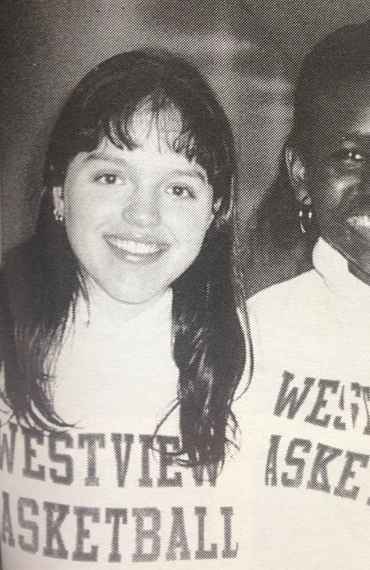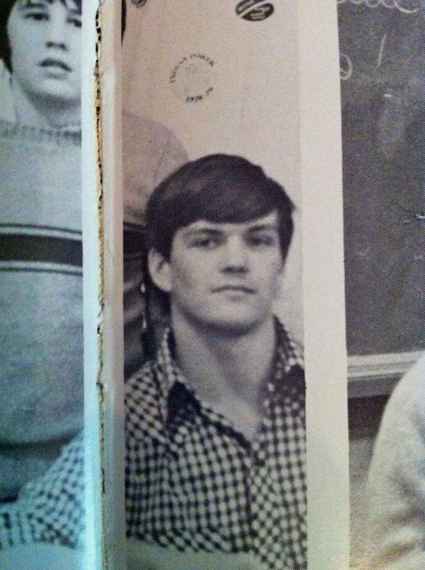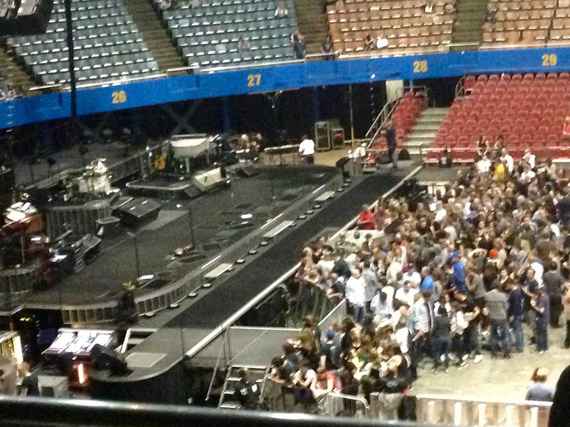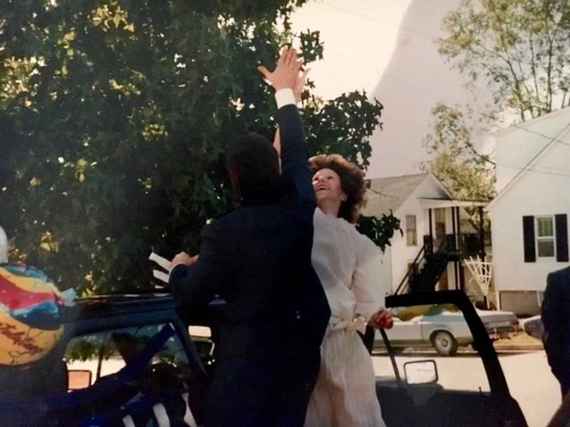This article was originally published on xoJane.
Memorizing "Rosalita" happened over time: first a few trips, then a few days, then weeks, then years, all riding passenger side by my dad as he drove me from lacrosse games to choir practices, teaching me most everything I needed to know about the ups and downs of life through disc after disc of rock and roll.
"You don't have to call me lieutenant, Rosie, and I don't want to be your son! The only lover I'm ever gonna need is...sub-da-le-da-dung... What is he saying there?" I asked.
"Just gibberish. Words that sound good together," my dad answered, always trying, best he could, to keep me separate from a world where girls and women are constantly sexualized, even by the saintly Springsteen.
"It sounds like he's saying tongue."
"It's not tongue."
"Does this one have lyrics?" I asked, pulling the cover of The Wild, the Innocent, & the E Street Shuffle from its plastic case.
"Doesn't reading in the car make you sick?"
"No." I read the lyrics. "He's saying tongue. The only lover I'm ever gonna need's your soft sweet little girl's tongue. What does that mean? Like, he's going to cut out some girl's tongue and keep it in a jar?"
"It's gibberish. Silly lyrics for silly characters."
We sang "Rosalita" over and over, word by word, and it moved from my ears to my mind to my heart, transforming my every instinct of what music was and what storytelling could be. To this day it's still my favorite Springsteen song.
We did the same for "Thunder Road," "Born to Run," and "Backstreets." We played the tracks relentlessly, they never got old, we never tired of a single line. We stopped by Michaels craft store and bought poster board so I could write out the lyrics and hang them on my walls. I was a freshman in high school then, and my friends didn't get it. "What are these, like, long poems?" they'd ask.
"It's Springsteen," I'd say. "You should listen to him, he's amazing." They didn't.
I can understand why it could have been difficult for even my most musically inclined friends to fall for Springsteen as hard as I did as a preteen and teenager without having my dad to show them the way. One needs musical context to truly appreciate the talent and genius that is the legendary E Street Band. My (and my younger brother's) music education started very early. It did not take much time for my dad to reach his limit with our Raffi records, and he swiftly subbed them out for LPs like Peter, Paul, and Mommy, then Mary, then the Beatles' Red and Blue box sets, then the Fab Four's original albums in all their glory. From the Beatles, we moved forward in our own directions: My brother was taken in by the Rolling Stones and Led Zeppelin, while my own interest in the emo scene of the late '90s and early 2000s prompted my dad to introduce me to punk with bands like the Ramones and the Dead Milkmen.
We were living in Missouri then, where my parents were both born and raised, and my brother and I were too. It's a diverse state in all ways -- politically, socioeconomically, racially. I saw the very difficult and poor life my dad had growing up, and I witnessed it for weekends and summers myself when I stayed with my grandparents in St. Joe, where my dad spent most of his formative years. I would leave it, as he did, for a better life in St. Louis, where we lived for a long stretch. It was a city my dad worked so hard, for years stacked on years, to reach, and his climb was not lost on me.
The transition from blue collar to white collar, from the life of "Workin' in the field till you get your back burned," which my dad literally did detasseling corn and walking beans, to a life of "Put your makeup on, fix your hair up pretty, meet me tonight in Atlantic City," which my parents did more and more as I grew older and they moved up in the world, is my dad's life captured in Springsteen's music. At least that's what I heard and pictured when we'd drive and sing and love those albums together.
The end of "Thunder Road," my dad once told me, is what he screamed out when he graduated from high school and pulled himself out of poverty with a full-ride scholarship to engineering school on the other side of the state. I picture him and my mom driving away together whenever I hear it now. "It's a town full of losers, I'm pulling out of here to win! " They, and their closest friends from those years, did drive away, did win. As the music crescendos, their cars speed out of their pasts, racing toward their futures as the song ultimately fades into the unknown, bright, major-key distance.
I don't know how old I was when my dad bought The River for our car rides. Maybe 16? I just remember I wasn't really into it, while my dad said he'd forgotten how good it was, and that it might have been his favorite Springsteen album, actually.
The River was so difficult for me that even through last year I still skipped many of its tracks. I could always get into "Sherry Darling" -- likely for its "Rosalita"-like party atmosphere, characters, and lively storytelling -- as well as "Out In the Streets" and "I'm a Rocker." While living in New York for grad school and afterward, a good friend and I would see Springsteen cover bands for less than $10 on East River cruise ships and at the Brooklyn Bowl with diehard born-and-raised fans from Jersey. "Hungry Heart," "Jackson Cage," and "The Ties that Bind" were always in the cover bands' rotations, so I learned to love them. Still, though, I couldn't relate to them the way I did his earlier records.
When The River Tour 2016 was announced late last year, I knew we had to go, my dad and me, and I hoped that in hearing the songs live I would fall in love with the album to the degree that so many Springsteen aficionados I know already had. We lucked out big time and scored good seats through Ticketmaster for the first show at the L.A. Memorial Sports Arena, the same place I saw Springsteen for the first time with a college boyfriend in 2009 for the Working on a Dream Tour. As Clarence Clemons blasted his sax on what would unknowingly be his last tour with the E Street Band, I had only one thought: I should really be here with my dad.
My dad, like so many characters in Springsteen's songs, is frugal. Because he coupon-clipped and night-shifted his way out of hardship, for many, many years, concert tickets, to him, were items too frivolous to purchase. While I couldn't get enough of live music, spending almost every cent of my high school lifeguarding money on shows, my dad, the music lover to end all music lovers, didn't see a single concert while I was growing up. I'm sure he just couldn't imagine spending extra money on something fun for himself, even when there was extra money to spend. When I told him I was seeing Springsteen in 2009, he was supportive but not interested in attending. I wasn't sure what he'd say to my request that we try for tickets in 2016, but, surprisingly, he was up for it.
A lot happened with my relationship to Springsteen in the seven-year gap between the Working on a Dream Tour and The River Tour's revival. For a few years before the cover bands and Jersey cruises, I felt, for the first time, lost when it came to the Boss. While I was saving for my Working on a Dream ticket, I was applying to grad school for an MFA in screen and TV writing. Both Columbia and NYU asked for a list of my creative influences, and, without hesitation, Springsteen was the first name I wrote down (NYU liked this; Columbia did not). But after grad school, after six straight years of being a minority voice in my classes just for being female, after six straight years of female classmates writing male protagonists and male classmates writing male protagonists, after my first few unsuccessful meetings pitching stories starring women, after my first few job interviews trying to be taken seriously as woman qualified for any job not strictly for Lifetime, the reality of where women stand in the world of pop culture and in the entertainment industry incessantly pummeled me from all sides. And so it dawned on me: I had grown up reading the male point of view, watching the male point of view, singing along to the male point of view, relating to the male point of view, because that was all that was offered to me by both my schools and society. But I am not male and my voice is not male. It suddenly all felt so wrong.
This awakening left me pretty furious with everyone from Wes Anderson (who I actually do love) and his endless ability to secure financing for movie after movie of white male daddy issues (all of which I actually do love) to Shakespeare, Chekhov, Beckett, Albee, and Vonnegut (all of whom I respect and enjoy immensely) for being our literary greats who all also happen to be white males, to -- yes, of course -- Springsteen for never letting me, that is, any young female character, take the lead in even one song. Springsteen was everything to me, but I was nothing to him. I thought about it, I wrote about it, I hated it.
Still, I said he was my favorite musician, but I noticed something else happening when I did: Other than my one female friend who saw Springsteen cover bands with me, I was always talking to men about the Boss. I was always reading what men thought and felt about the Boss.
Of the 75 essays published in the 1996 anthology Bruce: The Rolling Stone Files, only three were written by women, one of which was a puff piece with quotes from his fans, and all of which were printed in '84 and '85. Since then, Rolling Stone has not had any women write about Springsteen, and all of the current coverage of The River Tour 2016 has been written by one man. Of the 48 complied pieces in 2004's Racing in the Street: The Bruce Springsteen Reader, which features an introduction by Martin Scorsese, only seven articles are written by women, one of which is an excerpt from Prozac Nation, another of which is a general essay on growing up in Asbury Park, and a third of which is a quick note on Bruce's father passing away from a local New Jersey paper. Feminist writer Rebecca Traister is a known Springsteen fan who wrote articles on the Boss while on staff at Salon, of which the two most well known are about an alleged Springsteen affair with a New Jersey housewife and an essay dedicated to Springsteen's wife and bandmate, Patti Scialfa.
The extremely limited amount of material on women relating to the music of the E Street Band was and is still so difficult for me to process. How can something that speaks to me so clearly exist under the assumption that I'm not even listening? This music matters to me. This music makes meaning of the world for me. Where is my voice in regard to it? Why doesn't it matter that I, too, think it matters?
My ex-boyfriend met Clarence Clemons at the Barnes & Noble where he worked when the Big Man was there for a book signing of his 2010 memoir. My ex got one autographed copy for himself and one for his brother, but none for me. When I learned this, I was so shocked I didn't know what to say. We first bonded over our shared love of the E Street Band, and we had just seen them live together, but he got a book for his brother, who he considered the "only die-hard fan he knew" other than himself, and forgot me altogether.
I later went out on dates with guys who loved Springsteen and would quiz me on my knowledge of the Boss, always eventually declaring, "Oh, OK, so you're a real fan," as if young women couldn't possibility appreciate his music the way they could, as if there was a chance they knew something I didn't. One guy asked me to put my favorite albums in order. "Wild & Innocent, then Born to Run, then Darkness," I said.
"Wild & Innocent is the album people say is their favorite because they feel that's what they should say," he replied.
"It's my favorite," I said, instantly pissed off. "What's yours?"
"Nebraska," he said.
Nebraska is the favorite album of over-privileged depressed white guys with no authentic feelings of their own to express, I thought. (It's also become a red flag, now alerting me to Springsteen fans who trend toward asshole, including the ex-boyfriend who didn't get me Clarence's autograph.)
Before we went into the arena for The River, my dad and I compiled a list of the top 10 Springsteen albums for what might have been the thousandth time in the past year alone. I kept Wild & Innocent at the top and said I likely always will, but I was open to and hoping that hearing The River live would wow me in a way no other Springsteen album had yet.
It did.
The River was a record where I was trying to figure out where I fit in in the broader community. By the time I got to The River, I'd taken notice of the things that bond people to their lives. Work commitments, family, love. I wanted to imagine and write about those things. I figured if I could write about 'em, maybe I could get one step closer to havin' 'em in my own life. So that's what I did. I wanted to make a big record that felt like life, like life and an E Street Band show. I wanted the record to contain fun, dancing, jokes, laughter, politics, sex, good comradeship, love, faith, lonely nights, and, of course, tears, and I figured if I could make a record big enough to contain those things, maybe I'd edge a little closer to the answers that, at home, I was trying to find.
Hearing that introduction, and hearing the album live in its entirety, I understood why The River was so difficult for me when I was a teen. It was Springsteen's growing-up album, and I was not yet grown. I fell in love with the flashy rhymes and intricate details of his storytelling and the explosive, all-encompassing music of the E Street Band hearing his early albums as a kid -- I just hadn't lived enough then to understand The River when my dad first played it for me.
Because it is an album that features, like Springsteen said, a hard look at the real responsibilities of long-term relationships and all kinds of adult commitments, I do feel like it gives the women featured in its songs more dimensionality than most of the other female characters, often in need of some sort of saving, in many of the Boss's other epic rock songs and ballads. Though it's been 36 years since "Marry You" was first released, a song that came out seven years before I was even born, it still resonated with me as possibly the best wedding proposal I could hope for myself in 2016. As Springsteen sang out, "To say I'd make your dreams come true would be wrong, but maybe, darling, I could help them along," a decidedly loving and feminist outlook on what a marriage could provide, I felt so connected to the music. Maybe he did get me, maybe I was in there.
I'll admit, even after grad school, I often skipped the final tracks on The River to get back to the start of disc one, to the party songs and "Sherry." It's mostly a shame, because it means for many years I deprived myself of at least trying to bond with some of Springsteen's finest work. But it also was a bit of a hashtag-blessing, because, standing in the L.A. Sports Arena, when the lights dimmed to nothing but black and blue and Soozie, Nils, Bruce, Steve, and Patti took their places in a straight line in front of their mics to play "Stolen Car," I discovered Springsteen all over again, in a new way. "Stolen Car" doesn't mean to me what it meant to Springsteen when he wrote it, I know. My interpretation is loose and based on feeling, but, damn it, this song describes how I feel in my life right now more than anything else can.
My life has been tumultuous and confusing, especially so in the past few years. I finished school, started and stopped jobs that were close to what I wanted to do but not exactly right, have struggled to support myself, have struggled to matter in this world as a woman, have struggled to matter in my romantic relationships as an individual. I've dealt with reproductive diseases the medical world and world at large still do not care about. I've been well, I've been sick, and I've been alone.
When Springsteen sang, "Little by little we drifted from each other's hearts," he was singing about all those beginnings and endings for me, with people, occupations, and locations. When he got to the chorus, "And I'm driving a stolen car, down on Eldrige Avenue, each night I wait to get caught, but I never do," he set music to my subconscious thoughts and feelings: I'm moving through the world as a straight, single white female in my late 20s. I'm trying to carve out something for myself, and most of the world still thinks I shouldn't be. I should at least have a boyfriend by now, someone who can support me so I can have kids before I turn 35. I'm not saying I wouldn't be open to that if I were in love with someone, but right now I'm not, and right now I'm chasing something else. Something else that's still rare for many women to chase. It does feel like I've stolen a life society isn't sure I should have, and every day I wake up, I'm just wondering if I'll be able to pull off another day of it before I'm stopped and forced onto a more traditional path for my sex.
And if that should happen, if I should "Fade Away," if all I've tried to achieve up to this point were to be lost, if I were to give up, if I were to be silenced, if Springsteen were to remain for the boys and not for me, if he were to still matter to the men but not the daughters, not the girlfriends and wives, not the young women living and singing and dancing alone to his lyrics, this is what would happen, this is what it would mean for my life:
I'm driving a stolen car,
On a pitch black night,
And I'm telling myself I'm gonna be alright.
But I ride by night, and I travel in fear
That in this darkness I will disappear.




